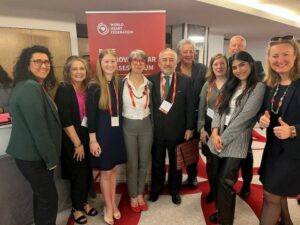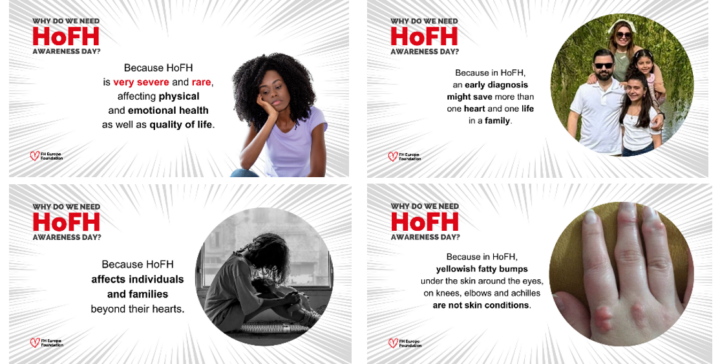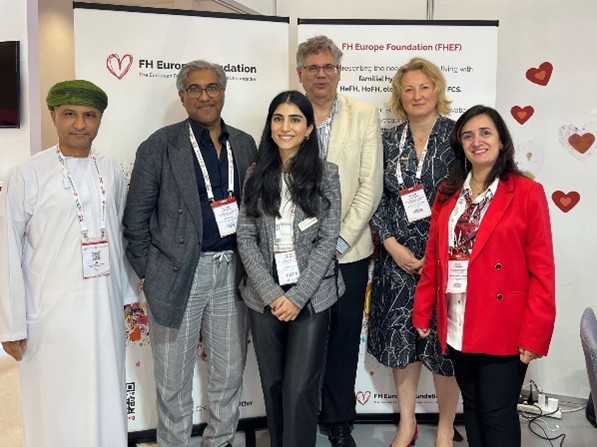We are delighted to welcome two new members to the FH Europe Foundation team, further strengthening our network and expertise. Their commitment and experience will contribute significantly to our mission of improving the lives of those affected by inherited lipid disorders.
Maja Bartoszewicz-Moritz Joins as Project Manager for Rare Diseases
We are pleased to introduce Maja Bartoszewicz-Moritz, who joins FH Europe Foundation as Project Manager for Rare Diseases. With over 15 years of experience as a rare disease advocate, caregiver, and patient representative, Maja brings a wealth of expertise to our team. She leverages her deep knowledge in healthcare systems across Sweden, Italy, Poland, and speaks four languages, making her well-equipped to drive meaningful change.
With a background in leadership, cross-sector collaboration, and stakeholder engagement, Maja bridges the gap between patients, caregivers, healthcare professionals, and industry leaders. Her advocacy journey became deeply personal when her daughter was diagnosed with a rare genetic condition in 2018, fueling her mission to amplify underrepresented voices and improve healthcare accessibility.
Combining a strong understanding of medical, commercial, and insurance sectors with a passion for collaboration, Maja is committed to ensuring that those affected by rare diseases receive the support and recognition they deserve. She firmly believes: "Alone, I can make an impact. Together, we can change tomorrow."
Magda Anthousi Joins as Project Manager
We also welcome Magda Anthousi to the team as EU Projects Manager. A Cypriot professional based in Limassol, Magda has a diverse background in public health, chemistry and banking. She holds a degree in Chemistry from the National and Kapodistrian University of Athens (EKPA) and began her career in the pharmaceutical industry at MEDOCHEMIE. She later spent 18 years at the National Bank of Greece (Cyprus) Ltd, where she also obtained a diploma in banking.
After leaving the banking sector, Magda pursued a master's degree in public health (CUT), with a focus on biostatistics and epidemiology. Currently, she serves as an external research associate at the Cyprus University of Technology (TEPAK), a chemistry teacher in the public education sector in Cyprus. Since December 2024, Magda has been involved in PERFECTO FH and is taking over management of PerMed FH and FH EARLY as a Project Manager at FH Europe Foundation. Her multidisciplinary background and commitment to public health make her a valuable addition to our team.
“We are delighted to welcome Maja and Magda to our team and community. Their professional expertise, personal experiences, and dedication will help us make a significant impact in both rare disease advocacy and the delivery of EU-funded projects,” says Magdalena Daccord, CEO of FH Europe Foundation.
With these new additions, FH Europe Foundation continues to expand its impact and drive meaningful change in the field of inherited lipid disorders. We look forward to working together towards a healthier future for all affected individuals.
For patients living with Homozygous Familial Hypercholesterolaemia (HoFH) in Lebanon, access to life-saving treatment has been an ongoing challenge. Due to the country’s ongoing crises, LDL apheresis—the only available treatment for HoFH patients in Lebanon—was discontinued for a period, then resumed inconsistently. This uncertainty placed patients at high risk for premature cardiac events and severe complications.
On February 17, 2025, a pivotal meeting took place at the Presidential Office of Lebanon. Representing FH Lebanon, an informal patient support group, I, Chyrel Lichaa, FHEF HoFH Patient Ambassador, was joined by Rose Chahine and her son Marc Salloum, HoFH patient, as well as Saide Salloum, who tragically lost her son and our friend Wassim Nissi due to the lack of treatment.
Together, we met with the Advisor to the President of the Republic of Lebanon to advocate for consistent and sustainable access to LDL apheresis.
The Road to the Presidential Office
This meeting was not an isolated effort but the result of sustained advocacy. Leading up to it:




The Meeting: A 20-Minute Window to Make an Impact
Understanding the constraints of time in such high-level meetings, we planned the flow of our intervention, ensuring that each of the advocates (me, Rose, and Saide) had the chance to speak and share our personal experiences while backing them up with existing scientific evidence. For that, we liaised with FH Europe Foundation and Prof. Marianne Abi Fadel. Unsure of how the meeting might evolve (limited time, emotions, unexpected questions) we also prepared and printed support materials. Those included:
During the discussion, we addressed fundamental questions about HoFH—what it was, why treatment was essential, and how treatment frequency affected its efficacy. We also shared personal experiences, with both Marc and me providing firsthand insights into the challenges we face as people living with HoFH, alongside Saide and Wassim’s tragic story.
A Positive Response & Next Steps
Despite Lebanon’s complex and tense situation, we were met with a receptive response. The Advisor to the President assured us that our concerns would be escalated to the new Minister of Public Health and other key healthcare authorities. The commitment was clear: no patient should have to worry about where their next treatment is coming from.
As a next step, our case file will be formally discussed with the Ministry of Public Health, and a follow-up meeting will be scheduled in the coming weeks. This will provide an opportunity to delve deeper into actionable solutions for ensuring consistent treatment for all HoFH patients in Lebanon.
Hope for the Future
This meeting was a significant step in our fight for treatment access, but it is just the beginning. Advocacy requires persistence, and we remain committed to ensuring that HoFH patients in Lebanon receive the care they need and deserve.
We sincerely appreciate everyone who has supported this cause.
Our special thanks go to FH Europe Foundation for empowering us and providing essential documents and evidence to strengthen our case. We are also deeply grateful to Professor Marianne Abi Fadel, whose ongoing support, data, and direct involvement with the Ministry have been invaluable, and to Professor Samia Mora for her unwavering commitment, and to everyone who cosigned the high-level advocacy level letter: Magdalena Daccord, Prof. Dirk Blom, Prof. Khalid Al Rasadi, Prof. Børge Nordestgaard, Prof. Marianne Abi Fadel, Prof. Albert Wiegman, Prof. Samia Mora, Michelle Winokur, Maria Nassif.
And finally, to everyone who stood by us and contributed to this journey—your support is instrumental. We look forward to continuing this mission toward a future where no patient is left behind.
FH Europe Foundation is excited to announce our attendance at the prestigious EURORDIS Black Pearl Awards on Monday, 24 February 2025, in Brussels.
This annual event, taking place in February, which also marks the occasion of Rare Disease Day, celebrates the outstanding achievements of people living with a rare disease, along with those who go the extra mile to make a difference in their lives.
The awards celebrate hard work, innovative thinking and dedication to the rare disease community.
This year, in recognition of the of the advocacy efforts by the FH Europe Foundation Ambassadors, we asked the Ambassadors living with FCS and HoFH to nominate one from each group to attend the event and to represent the community raising awareness of the rare familial hyperlipidaemias. We are proud to have two of our exceptional patient ambassadors nominated to attend in person along with our Community Engagement Manager.
Representing the FCS community, we have Helga Davidson from Scottland, whose dedication to raising awareness and FCS community support and education has made a significant impact over the past months. Joining her is Athanasios (Thanos) Pallidis from Greece, representing the HoFH community. Thanos's commitment to the cause is truly remarkable, having been nominated for the EURORDIS Young Advocate Award in 2021 for his tireless efforts in raising awareness about HoFH while managing the condition himself. His passion has contributed to improved global FH policy, patient advocacy, and increased awareness among the European medical community. Thanos was among three finalists. Unfortunately, due to COVID-19 restrictions in 2021, he was unable to attend the ceremony in person as it was held online. This year's event presents a special opportunity for him to experience the full impact of the Black Pearl Awards firsthand.
Familial Chylomicronaemia Syndrome (FCS) and Homozygous Familial Hypercholesterolaemia (HoFH) are two rare and serious familial lipid disorders.
🔹 FCS is a genetic condition that causes an extreme build-up of triglycerides in the blood, leading to painful and debilitating symptoms, including severe abdominal pain, recurrent pancreatitis, and chronic fatigue. With strict dietary restrictions and a significant impact on daily life, those living with FCS face immense challenges and a critical need for better treatment options and awareness.
🔹 HoFH is the most severe form of familial hypercholesterolaemia, a genetic disorder that results in dangerously high cholesterol levels from birth. Without early diagnosis and intervention, individuals with HoFH face a high risk of premature cardiovascular disease, often experiencing heart attacks or strokes at a young age. Access to specialised care, innovative treatments, and global awareness are crucial in improving outcomes.
Raising awareness and advocating for these communities is at the heart of FH Europe’s mission. The Black Pearl Awards provide an invaluable platform to spotlight these conditions, connect with key stakeholders, and drive forward the conversation on research, policy, and patient support.
Accompanying the patient Ambassadors will be Emma Print, FHEF’s Community Engagement Manager. Emma will use this valuable opportunity to connect and network with other peers from the international rare diseases community. “I believe this will be a very inspiring event! I look forward to meeting other incredible advocates from the rare diseases community and learning from them. I am sure we can put those insights into good use with the FHEF wider community, furthering our mission, across all disease areas.”- said Emma.
Stay tuned for updates and highlights from the EURORDIS Black Pearl Awards 2025!
FH Europe Foundation proudly supports Rare Disease Day. We invite you to register for our Rare Disease Day webinar and participate in our campaign.
Related topics: Vote Thanos 2021
We are following up once again with some exciting news. After several sessions of intense discussion, debates, and negotiations, the Member States of the World Health Organisation Executive Board made a decision to recommend the adoption of the World Health Assembly Resolution on Rare Diseases to the 78th WHA in May! The discussion was resumed once Member States made a decision on the financing issue. You can read RDI’s full statement following this result here.
A Significant Milestone for Rare Diseases
This marks a crucial achievement for the rare disease community. With 26 total cosponsors now and 224 organisations part of this coalition, it is evident that momentum is growing, and rare diseases are on their way to becoming a true global health priority. FH Europe Foundation is proud to be part of this coalition, working alongside global partners to push for meaningful change and improved care for those living with rare diseases.
What’s Next?
While this is an important step forward, there is still work to do! The Executive Board has recommended the adoption of the Resolution to the World Health Assembly in May 2025, but it is not yet officially adopted. We must continue to build momentum and support to ensure the successful adoption and implementation of the Resolution at the 78th WHA in May, where all Member States will vote on its adoption.
In the run-up to the WHA, we urge Member States to enhance and maintain their commitment and collaboration to secure the adoption and implementation of the WHA Resolution on Rare Diseases and the Global Action Plan. You can join this call by sharing our posts on social media and making sure that the voices of People Living With a Rare Disease (PLWRD) are heard.
How You Can Stay Engaged
If you missed the Executive Board meeting but would like to watch the discussion and decisions, you can rewatch the Executive Board meeting sessions via this link. The WHA Resolution on Rare Diseases was discussed during Sessions 4, 5, and 18 under agenda item 6 (UHC).
We will follow up soon with our next steps leading up to the WHA and how the coalition can continue to support this initiative. In the meantime, thank you all once again for your dedication and support—this is a win for all of us.
Coalition Update
We also want to share our updated coalition logo with you. It is incredible to see how much this movement has grown and how many voices have united to advocate for rare diseases on the global stage.
Let’s continue pushing forward together! As part of our request, we'd love for you to share any updates you come across and tag us or forward them to us directly. The more eyes and ears, the easier it is for us to stay informed and keep track!
Click here to learn more about WHA World Health Assembly.
Click here to learn more about WHO - World Health Organization (WHO).